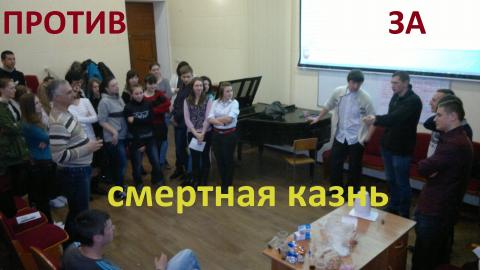The death penalty: State government tool or “social justice?”
Does the state have the right to decide who should live and who not? How are justice and punishment interrelated? Can death be a legitimate punishment for a crime? These and many other questions were asked by members of the Social and Legal Movie Club at a regular meeting held on March 28 in the Crimea.
According to the “Network of Legal Advice Offices of the Crimea”, the audience was offered two films directed by Viktar Tratsiakou, “Cause of Death ----” and “Departed on Sentence,” both dealing with the issue of the death penalty in Belarus. After watching the participants discussed the death penalty from different perspectives. For example, the possibilities the death penalty provides to a modern state or the “threats” carried by the death penalty as “the ultimate social justice.” The talk on the death penalty grew into a lively discussion, which addressed issues of law and the modern system of justice, and offered an ideal model of the state. Many opponents of the death penalty argued that the punishment cannot exist in a law-governed state, as the ultimate value in such a state is the person’s life.
The Movie Club members also learned about the work of the Human Rights Center “Viasna”, the Belarusian Helsinki Committee, Amnesty International, who oppose the death penalty in all cases without exception.
The result of the discussion was an impromptu national referendum with a question, “Should Ukraine introduce the death penalty as the capital punishment?” 80% voted against the imposition of the death penalty, while 20% said “Yes” to the punishment. Thus, the young people made their choice and answered the question, “Does the state have the right to administer “God’s judgment.”


